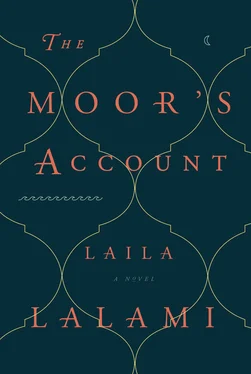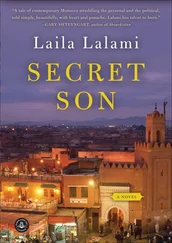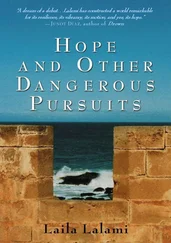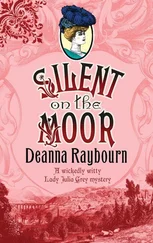Now the patient was covered with hot glasses, little towers of different colors on the black field of his back. Though it was unbearably hot in the tent by then, he did not move or complain — a good sign, I thought. When the healer began taking the glasses off, each one left behind it a raised circle.
The tent was silent now, united in its desire to see whether the treatment would work. The patient took a deep breath, as if waking from a long and pleasant dream. It was only when he sat up that I noticed he had only one arm, but before I could turn on my heel, I came face-to-face with my father. We stared at each other, each surprised to have found the other in such a place. The healer gave my father a glass of water. Drink, he said, to your health.
But my father pushed the glass away. With his one good hand, he pulled me up by the hood of my jellaba and kicked me all the way back to the msid, where, upon receiving custody of me, the fqih proceeded to cane my feet until they swelled — my punishment for skipping school.
It was often like this with my beloved father. His years of training at the Qarawiyin had instilled in him a deep belief in the importance of learning, the necessity of discipline, and the rightness of our faith. Unlike my mother, who nourished me with stories, both real and imagined, my father, though he loved me, often spoke to me only to correct me or to advise me, and so I learned to keep my peace whenever I was in his presence. Hoping to cure me of my love for the souq and to breed in me an interest in the law, he began to take me with him whenever he met his customers. But I maintained my silence. Silence taught me to observe. Silence made me invisible to those who speak. Year after year, I witnessed my father write contracts for other people, and I began to wonder what it would be like to be a rich merchant, instead of a simple recorder.
3. THE STORY OF THE ILLUSION
The three Castilians who were killed in the Battle of the Río Oscuro were buried under the pale light of a crescent moon, in a ceremony overseen by the commissary. In the bushes, the grasshoppers were singing, so the old friar had to raise his voice over their frenetic chants in order to be heard. My brothers, he said. These men of faith and honor were devoted to God our Lord and to His Majesty the King, for it was in the service of both that they came to the Indies. They have fallen in battle, but their courage and sacrifice will remain. The commissary spoke in the level voice and practiced formulas of a cleric who had spent much of his life in the farthest corners of the empire, where death was at once spectacular in its violence and common in its frequency.
The young friars standing behind him looked on with terror, especially the one who was swinging the incense, a wispy lad by the name of Father Anselmo. I remember him well, not just because of what happened much later on the Island of Misfortune, but because he stood out immediately among his brothers in brown robes. He was the youngest of them and yet the tallest; he had thick, carrot-colored hair around his shaved crown; and he was afflicted with a terrible and unpredictable stutter. This impediment made him the occasional target of jokes — good-natured jokes, for the most part, though sometimes people’s impatience with him was colored by meanness.
I did not stay to witness the three bodies being lowered into hastily dug graves because I had to prepare the evening meal for Señor Dorantes. When I went to draw water at the Río Oscuro, I found that the Indians killed in the battle, some fifteen of them, had been piled under a cypress tree. The dark heap of bodies, with arms and legs jutting out at odd angles, smelled of decaying flesh. The odor wrapped itself around my throat like a noose and made it impossible for me to breathe. Some of the bodies had been mutilated, I noticed, their noses, ears, or fingers cut out by the soldiers and hung from strings as keepsakes. Flies hovered around in a constant and unnerving drone. Altogether the heap gave me the impression of some creature of the underworld, lying in wait for whoever might cross its path. And indeed the Castilians moved carefully around it, without looking at it or speaking of it, as if they might wake it by sight or speech.
I went about my tasks that night, but all the while I kept thinking that it could have been me in one of the three graves, shovelfuls of earth thrown upon my unwashed and unshrouded body, my soul unprepared for my meeting with the Angel of Death, while a group of Christians above me delivered prayers in a foreign idiom. Or, if the battle had ended differently, if the Indians had won, perhaps I would have been piled with others under a cypress tree, my mortal flesh food for vultures and vermin. Either of these fates was repulsive to me — all I wanted was to return home, where I could die among my own kind.
Sleep eluded me that night. Holding on to my newly acquired hatchet, I tossed and turned, listening to the sound of unfamiliar animals in the distance and trying to ignore the smell of the dead bodies, which had begun to spread all around the camp. As soon as the moon began its descent in the west, I rose to start the fire and prepare the morning meal. Sunlight found me on the bloodstained riverbank, gathering my master’s things and getting ready for the march to Apalache.
Señor Dorantes was a light traveler. Many of the items he had chosen to bring from the Gracia de Dios — his clothes, linens, dishes, a few jars of salve, some cotton padding for his armor, a set of scales — fit in one traveling bag, which this servant of God had to carry on his back. But the other noblemen were less practical. In his saddlebag, the young Señor Castillo carried his treasured but cumbersome chessboard, which was a gift from his deceased brother. For this reason, he never lent it to others who might wish to play with it, but only used it for himself and his closest friends. As for Señor Cabeza de Vaca, the treasurer, he had brought with him several leather-bound books of poetry. Whenever he found the time, he would open one of his books at a random page and begin to read, sometimes declaiming the verses of Garcilaso de la Vega for the enjoyment of the other officers: cuando me paro a contemplar mi estado, y a ver los pasos por do me han traído …
Once the company was ready to depart, the governor forced his Indian captives down a native path that led deep into the wilderness. Take us to Apalache, he commanded. He followed them on horse, with his officers trailing behind him, their armor clanging and creaking in the quiet morning air. The gray metal of their livery looked out of place in the wilderness, alien and uncomfortable.
As the sun rose in the sky, the air grew hot and damp. Farther away from the river, the horses began to kick up dust, which made it even more difficult to breathe, so I wrapped a rag around my nose and mouth, in the style of the caravan merchants who came to Azemmur from the south. They would dismount in the marketplace, calling out to one another to water the animals or set up a tent, and then they would slowly unwrap their blue scarves from their heads and faces, revealing a dyed beard or a beaked nose or a surprisingly young face. My friends and I would run up to them to find out what they were bringing for sale on market day, whether it was jars of indigo and argan oil, or trinkets of gold and silver, or something else entirely, something exotic we could puzzle over as we sat in throngs, cracking sunflower seeds and watching the tents being set up. Memories of my hometown came to me at odd moments, just like this, when I least expected them, as if my grief liked to ambush me. I tried to push the images to the back of my mind, telling myself I would think of them only when I had a quiet moment alone.
Are they any good? Señor Dorantes asked suddenly. He was speaking of the fruits of the Florida palm trees, which I picked as we marched, collecting them in the pocket of my breeches so that I could eat them at mealtimes. Their strange taste had already grown ordinary on my tongue.
Читать дальше












